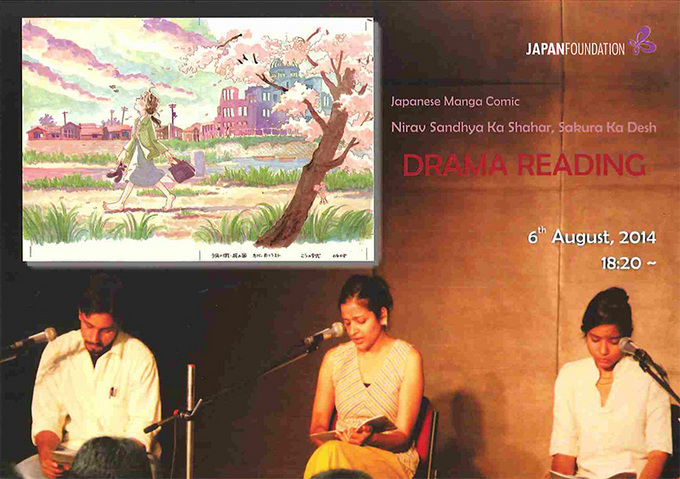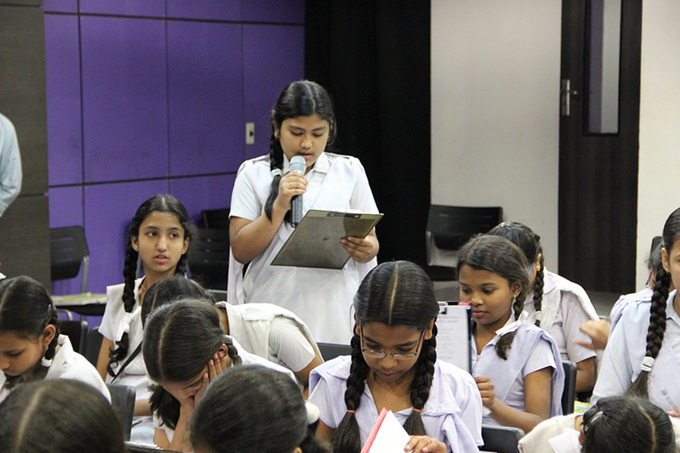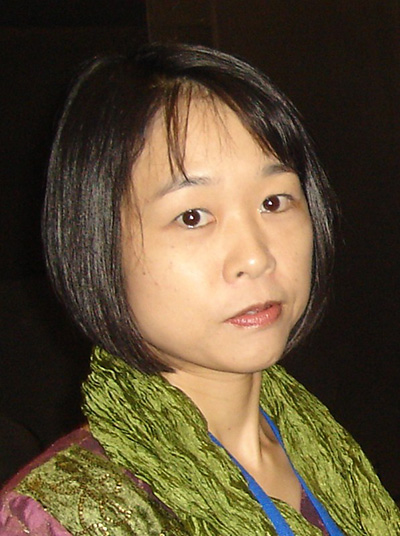Dramatic Reading of the Manga Town of Evening Calm, Country of Cherry Blossoms in Hindi
Tomoko Kikuchi (Hindi translator)
This year, as a project promoting peace in commemoration of the 70th anniversary of the end of World War II, the Japan Foundation, New Delhi hosted a screening of On a Paper Crane - Tomoko's Adventure (1993, directed by Seiji Arihara), a film made for peace educational purposes, and an art event to make paper cranes, which were to be dedicated to the Hiroshima Peace Memorial Museum. Some 50 students of local public schools participated in the event. Also, a poetry reading from the book Watashi ga Chiisakatta toki ni [When I was a Child] (edited by Arata Osada) was held together with a presentation of poems written by the participants.
These events were based on a dramatic reading of the manga Town of Evening Calm, Country of Cherry Blossoms (written by Fumiyo Kouno) held in 2014. Tomoko Kikuchi, the translator of its Hindi edition, who also served as lecturer for the dramatic reading, kindly contributed an article about the event.

The flier for the dramatic reading
Dramatic reading of Japanese manga in India
70 years ago, on August 6, an atomic bomb was dropped on Hiroshima. On August 6 last year, the Japan Foundation, New Delhi hosted an event in which five Indian actors performed a dramatic reading of Town of Evening Calm, Country of Cherry Blossoms in Hindi.
Set in Hiroshima in 1955, 10 years after the atomic bomb was dropped, the manga tells the tragic story of a young woman who survived the bomb and her niece, and a second-generation atomic bomb victim. It was translated from Japanese into Hindi in 2013 and published under the title Neerav Sandhya Ka Shahar, Sakura Ka Desh by Vani Prakashan, a New Delhi-based publishing company. This is the first attempt in India to translate and publish Japanese manga. Local people tend to think that manga is just for children, but in recent years understanding has been spreading throughout Indian society that Japanese manga, which covers various aspects of life, is suitable even for adults.
A dramatic reading of manga was a very unusual endeavor. The most interesting point of this program was that such a dramatic reading would be impossible in Japan. In principle, manga is something that is enjoyed individually, so Japanese readers usually have their own, unique image of each manga work, so much so that even movies based on manga are not positively received by fans. This program, on the other hand, was organized for an Indian audience that was relatively unfamiliar both with manga and with dramatic reading. The audience was listening to the actors' performance whilst reading from the manga distributed in advance. In other words, they had to engage in two activities simultaneously: reading the manga and listening to the lines from the stage. There are many adults who do not know how to read manga and how to follow the frames of the story. Also, it is extremely difficult to simultaneously enjoy both the text and the illustrations. Moreover, the Hindi edition was made in the Japanese fashion, with the book bound on the right side, while in India books are normally bound on the left, so having to read in the opposite direction was quite confusing for the Indian audience. On top of this, the story was quite complex and even Japanese people have difficulty understanding it from just one reading. Against this backdrop, after the end of the performance many participants said that the dramatic reading was much more comprehensible and enjoyable than reading alone, and that the incredible story had moved them deeply. Such opinions are a testament to the power of the original work and the performing talent of the actors.

Left: Indian students reading manga
Right: The dramatic reading performance
For the actors, the dramatic reading of manga was a new challenge. Throughout the performance, the audience was focused on the manga in their hands and, for the most part, did not watch the actors. Before the event, some of the organizers suggested that the audience would not take their eyes off the actors, but in fact not a single person did that. We are deeply grateful to the actors who understood the circumstances and agreed to participate in the dramatic reading.
Memorable peace education programs for younger generations
After the dramatic reading ended, a university student came up to me to express his wish to organize a similar dramatic reading at his university. Almost as important as making this reading a reality was my hope that it would serve as an opportunity for people to think about the atomic bombing and peace, and that the participants would in turn spread the word about the event among their families and friends, and this in fact came true after the event had finished. I was thinking that only then would our initiative have achieved success, so the words of this student made me very happy. We managed to subsequently organize a dramatic reading at the university he was attending.

An Indian student shares her impressions of the dramatic reading
To mark the 70th anniversary of the atomic bombings and promote bilateral exchange between Japanese and Indian students, this year we presented to today's Indian children the voices of children who survived the atomic bombings 70 years ago through a poetry reading from Watashi ga Chiisakatta toki ni. Going forward, we intend to continue to implement peace education programs that will firmly remain in the memories of the younger generations, who will shape our future.
 Tomoko Kikuchi
Tomoko Kikuchi
Hindi translator Tomoko Kikuchi has been living in India since 1992. She obtained her PhD in Hindi Literature from Jawaharlal Nehru University (JNU), New Delhi, in 2005. She wrote Mahadevi Varma Ka Vishvadrishti (Parmeshwari Prakashan, 2009) and translated the Hindi edition of Hiroshima no Pika (National Book Trust India, 2011), Town of Evening Calm, Country of Cherry Blossoms (Vani Prakashan, 2013), and Anguliyon Ka Orchestra (Vani Prakashan, 2015). She also translated the Hindi dubbed version of the peace-themed animation DVD On a Paper Crane - Tomoko's Adventure (Mushi Production, 2012), and writes for Japanese and Indian daily newspapers. In 2012, she received an award at the 9th World Hindi Conference held by the Government of India. She organizes culture programs and peace education programs for Indian students with the Japan Foundation, New Delhi.
Back Issues
- 2024.2.19 Movie Theaters aroun…
- 2024.2.19 Movie Theaters aroun…
- 2023.4.24 The 49th Japan Found…
- 2022.10.24 Inner Diversity <2> …
- 2022.10. 5 Living Together with…
- 2022.6.13 The 48th Japan Found…
- 2022.6. 3 The 48th Japan Found…
- 2021.11.29 Crossing Borders, En…
- 2021.3. 5 Crossing Borders, En…
- 2021.2. 8 Crossing Borders, En…

